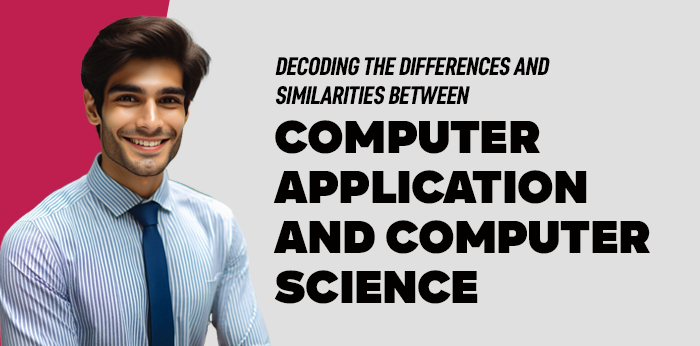
Computer Science and Computer Application are two closely related yet distinct fields with promising job prospects within technology industries. They both play pivotal roles in shaping the digital landscape contributing to the development and advancement of technology.
Computer Science is primarily concerned with the theoretical and mathematical underpinnings of computation. It delves into algorithms, data structures, automata theory, and the fundamental principles that govern computation. It provides a solid foundation for the development of software and systems.Computer Application Theory revolves around the practical aspects of utilising computational principles to solve real-world problems like developing software applications, addressing specific needs and challenges.
Computer Science and Computer Application play pivotal roles in shaping the digital landscape contributing to the development and advancement of technology.
Influencing everything from software development to data analysis and cybersecurity. Here are some of its notable trends:
Artificial Intelligence (AI) and Machine Learning (ML)
These two are transformative forces that are integrated into various software applications, driving innovation in all files of health, finance, and retail. This includes natural language processing and computer vision to predictive analytics and autonomous systems.
Cloud Computing
Cloud-based solutions have revolutionised how software applications are developed, deployed, and managed. Cloud computing offers scalability, cost-efficiency, and accessibility, empowering developers to create and deliver applications with greater agility and flexibility.
Internet of Things (IoT)
IoT devices and sensors have created a demand for applications capable of processing and analysing massive volumes of data generated by interconnected devices. The significant implications in these fields are smart home technology, industrial automation, and environmental monitoring.
Cybersecurity and Privacy
Data privacy is an inevitable part in the increasing scenario of frequency of cyber threats. In developing secure and privacy-centric applications. This includes integrating robust security measures, encryption, and compliance with regulations such as GDPR and CCPA.
Devops and Agile Practices
This enables software development teams to streamline collaboration, automate processes, and deliver high-quality applications with shorter development cycles.
Quantum Computing
Researchers and tech companies are exploring the potential of quantum algorithms to solve complex problems that are beyond the reach of classical computers, such as optimization, cryptography, and drug discovery.
Data Science and Big Data
The demand for applications that can harness the power of big data for insights and decision-making is driving the advancement of data science techniques, including large-scale data processing, machine learning, and data visualisation.
Blockchain Technology
Blockchain is gaining traction in cryptocurrencies curtailing supply chain management, digital identity verification, and secure financial transactions. This trend has led to the development of decentralised applications (DApps) and smart contracts.
Ethical and Inclusive Design
Promotes ethical use of data and algorithms with an emphasis on creating technology that is accessible to diverse user populations.
Edge Computing
This involves processing data closer to its source or edge of the network for applications requiring low latency and efficient use of bandwidth.
These two promising frontiers in technology are crucial for professionals and organisations that thrive to become innovative and competitive.
Exploring the Distinctions and Convergences Between Computer Science and Computer Application Theory
Abstraction Levels
Innovation and Research
Interdisciplinary Nature
Proficiency in programming languages (e.g., Java, Python, C++), software design, problem-solving, and collaboration.
Strong statistical analysis, data manipulation (e.g., with tools like Python or R), machine learning, and data visualisation skills.
Expertise in machine learning algorithms, programming languages (e.g., Python, TensorFlow, PyTorch), and a solid understanding of AI concepts.
Knowledge of cybersecurity protocols, network security, ethical hacking, and proficiency in tools like Wireshark and IDS/IPS systems.
Strong research capabilities, proficiency in theoretical computer science, programming languages, and a commitment to staying abreast of cutting-edge developments.
Proficiency in programming languages, software development methodologies (e.g., Agile), problem-solving, and collaboration.
Creative design skills, proficiency in design tools (e.g., Adobe XD, Sketch), understanding of user behaviour, and usability principles.
Analytical and problem-solving skills, knowledge of system architecture, and the ability to translate business requirements into technical specifications.
Strong organisational and leadership skills, project management methodologies (e.g., Scrum), effective communication, and stakeholder management.
Troubleshooting skills, customer service orientation, technical knowledge of software and hardware, and effective communication.
Proficiency in both frontend and backend development technologies, knowledge of databases, and the ability to work on the entire software stack.
Business acumen, strategic thinking, technical proficiency, adaptability, and a willingness to take calculated risks.
The Role of Data scientist in the field of Computer science and Computer Technology
Absolutely! The role of a data scientist is particularly relevant and exciting for computer science graduates due to its strong alignment with the foundational concepts
As a data scientist, one of the primary responsibilities is to analyse and interpret complex data sets to derive actionable insights for businesses and organisations
Data scientists often leverage machine learning algorithms and AI technologies to build predictive models and extract patterns from data.
Proficiency in programming languages such as Python, R, and SQL is essential for a data scientist. Computer science graduates typically have a solid foundation in coding and software development.
Effective communication of data-driven insights is a crucial aspect of the data scientist’s role. Computer science graduates, with their experience in developing software and user interfaces, are well-positioned to create compelling data visualisations and interactive dashboards that enable stakeholders to understand and act upon the findings.
Data science often involves exploring new methods, algorithms, and technologies to improve data analysis and decision-making processes.
Data science projects often require collaboration with professionals from various domains, including business, statistics, and domain-specific expertise..
Overall, the role of a data scientist is highly dynamic and multifaceted, demanding a combination of technical expertise, analytical skills, and business acumen.
In conclusion, while Computer Science and Computer Application Theory share a common ancestry, they diverge in their focus, scope, and approach. Computer Science provides the theoretical backbone, exploring the limits and possibilities of computation, while Computer Application Theory translates this knowledge into practical solutions for real-world challenges. Both fields are indispensable in the ever-evolving landscape of technology, contributing to the seamless integration of theoretical knowledge and practical applications.
You May Also Like